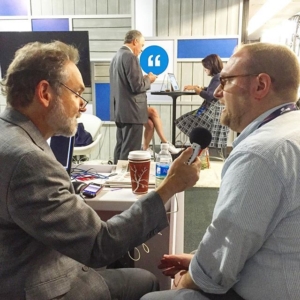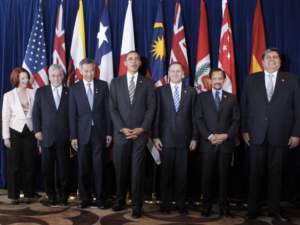Oppo Truths, Secret Meetings, and Rocking TPP
Here’s What You Need to Know
While attending last week’s Republican National Convention, Delve CEO Jeff Berkowitz was interviewed on the often misunderstood art of opposition research, as well as what role national security issues may play in the next Presidential administration.
- Jeff spoke to Jason Rantz of Seattle’s KIRO talk radio and outlined what goes into a campaign’s political research operation. Jeff explained how the process begins with a vulnerability study of the candidate’s strengths and weaknesses, as well as what issues may exist in their past.
- The vulnerability study process at Delve is unique because instead of using big questionnaires or relying on a candidate’s memory of their own past for a framework of potential attacks, we dig into every facet of the public record exactly as an opponent’s researchers would. We use this research to expose the narratives that could be used, fairly or unfairly, by a candidate’s opponents.
- Jeff highlighted the importance of sticking to the facts when launching attacks on an opponent’s record. Dispelling the common misconception of “oppo” as dumpster diving for personal attacks, Jeff explained, “it’s not just about this is a good person or a bad person, it’s also about, if you’re going to choose them to represent you, where do they stand on the issues.”
- Jeff also discussed how national security and foreign policy issues may be addressed by the next President, citing, “the crucial role of strong American leadership in the world.” Jeff went on to describe how these topics may impact Donald Trump and Hillary Clinton’s general election campaigns.
News You Can Use
Last week, a collection of left-wing entertainers launched a “Rock Against the TPP” tour to build opposition to the Trans-Pacific Partnership. The tour listed events in Denver, San Diego, Portland, and Seattle, with celebrities such as actress Evangeline Lilly and musicians Talib Kweli, Anti-Flag frontman Justin Sane, and Jonny 5 of the Denver-based hip-hop group Flobot. With the possibility of Congress voting on TPP in in a lame duck session, and the progressive wing of the Democratic Party feeling betrayed by the DNC, opponents of the trade deal are using celebrities to bring more awareness on this issue to many Americans. No word on whether Tim Kaine will make a guest appearance now that he has changed his tune.
HOW TO STOP OBAMACARE
The platform adopted by the Republican National Convention last week pledges “a Republican president, on the first day in office will use legitimate waiver authority under the law to halt [Obamacare’s] advance and then, with the unanimous support of Congressional Republicans, will sign its repeal.” But, as longtime health care policy analyst Chris Jacobs notes, the “legitimate waiver authority” provided under the law only applies waivers to states, not individuals. These waivers also only apply to a few delineated sections of the law, including the individual and employer mandates. Jacobs suggests a Republican President looking to halt Obamacare should instead focus on blocking insurance payments from the program that were unilaterally determined by the Obama administration for items like reinsurance, risk corridors, and cost-sharing subsidies without clear statutory authority.
Subscribe to Receive Insights
"*" indicates required fields
SECRET CEO MEETING
Beginning last summer with a secret meeting at JP Morgan Chase’s Manhattan headquarters, a group of America’s top CEOs – including Warren Buffet, Laurence Fink of BlackRock, Abby Johnson of Fidelity, and Mary Barra of General Motors – worked toproduce an open letter and detailed report on the “sorry state” of publically traded companies. The report includes a series of corporate governance “principles” on topics like executive and board compensation as well as earnings guidance. Intended to stir conversation within the business community, this effort could have policymaking reverberations as both parties tackle issues where corporate governance can help or hinder economic growth.
CAR-SHARING’S TAX-BURDEN
As ride-hailing apps like Uber and Lyft compete with car-sharing services like Zipcar and Car2Go, local governments have begun tipping the scales in favor of the former by increasing taxes on latter. New research by DePaul University’s Chaddick Institute for Metropolitan Development shows, “Of the 40 largest U.S. cities, 29 apply taxes of more than 10% on one-hour car-sharing trips, including nine cities with effective tax rates above 30%.” While most public discussion has been focused on how ride-hailing apps’ limited regulatory burdens hurt the taxi industry, it appears local authorities have used the same strategy to place car-sharing services in the same disadvantaged position.
IVANKA’S DRESS FOR LESS
During her primetime speech at the Republican National Convention, Ivanka Trump wore a $138 dress from her line of clothes sold at Macy’s department stores. Yahoo contributor Jennifer Gerson Uffalussy notes, “Wearing a look of her own design while making such a speech certainly affirmed the point of her speech: Ivanka is a mother-cum-scion in her own right.” This wardrobe choice comes after Hillary Clinton was criticized earlier this election cycle for wearing a $12,495 Armani jacket during a speech on income inequality. It’s a good reminder to campaigns that no detail is too small for the spotlight of the news and potential derision from your opponents.
THE NEW SOCIAL NETWORK IS OFFLINE
Modern economic theory has always emphasized the decisions of the individual and assumed individuals operate independently from the direct influence of others. Yet Paul Ormerod, writing for Evonomics, argues that today’s economic policies must acknowledge the fundamental importance an individual’s personal social network has on the outcomes relevant to these discussions. Ormerod’s conclusion is that our policies must move away from seeking to predict and control society, and instead look to build systems that are resilient and robust with the ability to respond well to unpredictable future events. This could be a new way of framing the debate between the innovations that can be produced with market-based policies versus sticking with old, liberal, command-and-control dogmas.
MEDIA NOT A FAN OF THE MEDIA
The state of the American media monolith is not strong. In fact, it’s at an all time low, with American trust in the media hovering around 20%. New York Magazine decided toinvestigate why news has lost the public trust by going straight to the source. The magazine’s survey of journalists and media figures pointed out several issues, including a lack of acknowledgment that news has become an entertainment business and thus does not handle serious issues well anymore. Survey participants also mentioned journalists thinking they know the story before they investigate. And because news is no longer immune to market forces, the media tends to go after the easy stories like gaffes and fuel for political partisanship. The lengthy critique of the media by the media shows that the Fourth Estate is just as troubled as the other three.
Mark Your Calendars
Monday, September 26: First Presidential Debate, Wright State University, Dayton, OH



